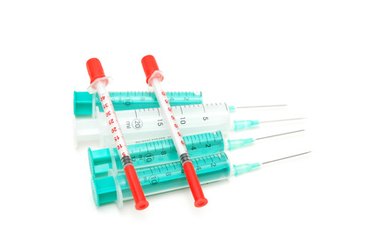
Hyperkalemia is a condition in which the levels of potassium in the bloodstream are abnormally high. There are many causes for hyperkalemia, mostly related to kidney disease because this organ helps control the levels of potassium in the body, and to hormonal causes. Administering glucose and insulin is one way to decrease the level of potassium in the bloodstream.
Causes
Video of the Day
Hyperkalemia usually results from acute or chronic kidney failure; from glomerulonephritis, in which the kidneys lose their ability to filter blood; and from rejection of a kidney transplant. According to Medline Plus, other causes include Addison's disease, a condition in which the body fails to produce enough aldosterone, the hormone responsible for controlling the absorption of potassium from the kidneys; and from the use of diuretics, medicines used to regulate blood pressure by increasing the excretion of fluids and electrolytes in the urine.
Video of the Day
Symptoms
The symptoms of hyperkalemia may be mild at first, but severe hyperkalemia can cause arrhythmias, or dangerous abnormal heart rhythms, which can eventually cause the heart to stop beating. One of the reasons to give glucose and insulin to people with hyperkalemia is to decrease the chance of developing arrhythmias.
Mechanism of Action
Most potassium in the body resides inside the body's cells, not in the bloodstream. Part of the treatment of hyperkalemia is driving potassium back into the cells. Insulin drives potassium into the cells by stimulating the uptake of the electrolyte by the cell membrane. This process begins within twenty to thirty minutes of the start of insulin treatment. Glucose is administered to facilitate this process and also to maintain glucose level in the bloodstream, as insulin can cause hypoglycemia, or low blood sugar.
Other Treatments
Other treatments for hyperkalemia include using intravenous calcium to prevent the heart from going into an arrhythmia; giving resins like sodium polystyrene sulfonate that bind the potassium inside the gut and drive it out of the gastrointestinal tract and, in severe cases, dialysis to quickly remove the potassium from the bloodstream.
Is this an emergency? If you are experiencing serious medical symptoms, please see the National Library of Medicine’s list of signs you need emergency medical attention or call 911.